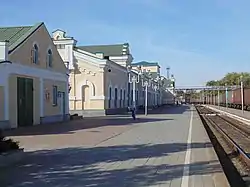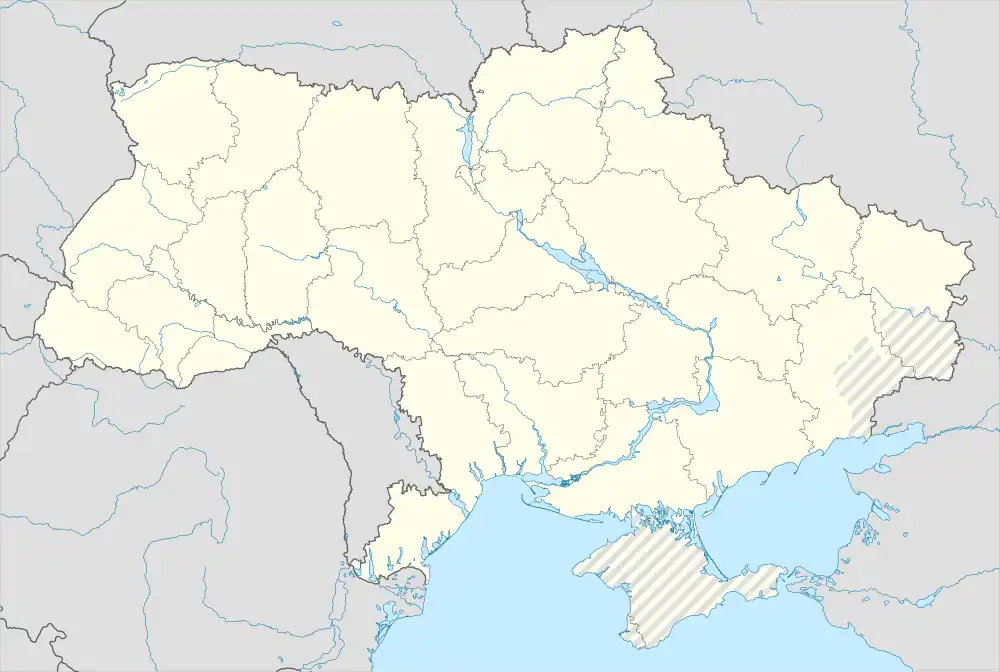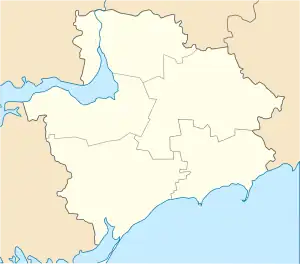Polohy
Пологи | |
|---|---|
 Polohy railway station | |
 Flag  Coat of arms | |
 Polohy  Polohy | |
| Coordinates: 47°29′N 36°15′E / 47.483°N 36.250°E | |
| Country | |
| Oblast | |
| Raion | |
| Government | |
| • Mayor | Yuriy Konovalenko |
| Population (2022) | |
| • Total | 18,111 |
| Climate | Dfa |
Polohy (Ukrainian: Поло́ги, IPA: [poˈɫɔɦɪ]; Russian: Пологи, romanized: Pologi) is a city in Zaporizhzhia Oblast, Ukraine. It serves as the administrative center of Polohy urban hromada and Polohy Raion within the oblast. Population: 18,111 (2022 estimate).[1] It is a significant railway junction.
Since March 2022, it has been under Russian occupation.
Geography
Polohy is located on the left bank of the Konka river, at the intersection of several railways, making it a significant railway junction.[2] The Polohy railway station is located there.
Across the Konka river is a village, also called Polohy.
History
Founding and the Russian Civil War
Polohy was established in 1887 after the construction of a railway that connected Berdiansk with Yekaterinoslav.[3] The city specifically celebrates 17 September as the date of the city's founding.[4]
By 1890, houses for workers had been built in the area. In 1894, the railway station was built, contributing to the growth of the village. By 1904, when a second railway line was built that crossed through the village, Polohy became a railway hub. In 1905, there were "about a hundred thatched huts and dugouts" in the village, and it had a total population of around 700.[2] The population of the village took part in the Russian Revolution of 1905, demonstrating for workers' rights and going on strike.[2]
The Bolsheviks took over the village in January 1918 during the Russian Civil War. However, in March the same year, Polohy was easily captured by the Central Powers during the 1918 Central Powers invasion of Ukraine. Local partisans resisted the occupation, and the occupying forces left the village in November 1918. It was captured by the anti-communist White Army in late December, before being recaptured by the Red Army on 5 February 1919. Continued fighting took place over Polohy throughout the war, involving Makhnovites, the Army of Wrangel, and South Russia, until an eventual Bolshevik victory in August 1920.[2]
In the Soviet Union

On 7 October 1923, the All-Ukrainian Central Executive Committee declared the establishment of Polohy Raion inside Berdiansk Okruha of Yekaterinoslav Governorate, with its administrative center in Polohy.[5] Polohy received the status of urban-type settlement in October 1928. From 1928 to 1937, Polohy carried the name of Chubarivka,[2] after the Soviet politician Vlas Chubar.[5] Polohy received city status in 1938.[6]
During World War II, Polohy was occupied by Nazi Germany beginning 5 October 1941. Oppressions against the local Jewish population - who had comprised 3.2% of the population prewar - began immediately.[3] In December 1941, a large number of Jews - either 70 families or 100 Jews, according to different reports - were murdered at Polohy as part of the Holocaust. There are some reports of subsequent mass killings of Jews and non-Jews at the same site over the following months.[7] Polohy was liberated by the Red Army on 17 September 1943.[3]
A cannery was opened in Polohy in 1967, which processed agricultural products.[2]
In independent Ukraine
Polohy urban hromada, a hromada (low-level administrative division) of Ukraine with its center in Polohy, was formed on 30 March 2018 from the union of several local councils.
Russian invasion of Ukraine
On 3 March 2022, Polohy was captured by Russian forces during the Russian invasion of Ukraine.[8] The city was shelled with Grad rockets and other weapons, heavily damaging many houses. Locals have accused Russian forces of deliberately destroying the city's critical infrastructure. Eyewitness reports from the city have also detailed accounts of Russian soldiers murdering civilians, sacking, abducting local activists, and torturing people in the city.[8] Water and electricity infrastructure has stopped working, as well as internet access and cellular communication. Food insecurity has become a problem for residents. While exact population estimates are uncertain, the Ukraine Crisis Media Center said that it was certain at least half of the pre-invasion population had fled by May 2022.[8]
Russian forces heavily fortified areas near the city in anticipation of the 2023 Ukrainian counteroffensive.[9] In May 2023, reports from ordinary residents of Polohy as well as the exiled mayor Yuriy Konovalenko said that Russia was forcibly removing civilians from the city to be transferred to Berdiansk, deeper within Russia-controlled territory.[10] In July 2023, a three-man Ukrainian drone team used an explosive-carrying drone to blow up a Russian electronic warfare system mounted on a tower in Polohy.[11]
On 8–10 September 2023, the 2023 Russian elections took place in the occupied Ukrainian territories,[12] which Melitopol mayor Ivan Fedorov described as "hellish pseudo-elections". During this period, on 9 September, Fedorov reported that the headquarters of United Russia - the Russian ruling party - in Polohy had been blown up.[13] Fedorov alluded to casualties among the occupation authorities, stating on Telegram that "Some went to the hospital, and some went straight to the morgue".[13]
Demographics
Distribution of ethnic groups according to the 2001 Ukrainian census:[14]
Notable people
- Oleksii Chubashev (1991–2022), Ukrainian soldier
- Volodymyr Kozak (born 1959), Ukrainian politician
- Viktor Poltavets (1925–2003), Soviet and Ukrainian artist
- Vitaliy Satskyi (1930–2017), Ukrainian politician
- Polina Zhemchuzhina (1897–1970), Soviet politician
References
- ↑ Чисельність наявного населення України на 1 січня 2022 [Number of Present Population of Ukraine, as of January 1, 2022] (PDF) (in Ukrainian and English). Kyiv: State Statistics Service of Ukraine. Archived (PDF) from the original on 4 July 2022.
- 1 2 3 4 5 6 "Пологи, Пологівський район, Запорізька область" (in Ukrainian). Retrieved 2023-09-08.
- 1 2 3 "Pologi". Yad Vashem. Retrieved 8 September 2023.
- ↑ "17 вересня – День міста". Archived from the original on 4 March 2022.
- 1 2 "Історія краю" (in Ukrainian). Archived from the original on 26 August 2016.
- ↑ "Поло́ги". Ukrainian Soviet Encyclopedia (in Ukrainian). Retrieved 8 September 2023.
- ↑ "Murder Story of Pologi Jews at the Fat Boiling Facility near Pologi". Yad Vashem. Retrieved 2023-09-08.
- 1 2 3 "Under the Russian boot: how citizens of Polohy live through hell of occupation". Ukraine Crisis Media Center. 17 May 2022. Archived from the original on 24 June 2022. Retrieved 24 June 2022.
- ↑ Balmforth, Tom (2023-04-27). "Insight: Russia digs in as Ukraine prepares to attack". Reuters. Retrieved 2023-09-08.
- ↑ Yankovskiy, Oleksandr; Badyuk, Olena (2023-05-12). "'Panicking For Real': In Anticipation Of A Counteroffensive, Russia Moves Thousands Of People From Their Homes In Southern Ukraine". Radio Free Europe/Radio Liberty. Retrieved 2023-09-09.
- ↑ "Ukraine's elite forces rely on technology to strike behind enemy lines". 2023-08-06. Retrieved 2023-09-09.
- ↑ "United Russia's headquarters smashed in temporarily occupied Polohy". 2023-09-08. Retrieved 2023-09-09.
- 1 2 "Official: 'United Russia' HQ destroyed in Zaporizhzhia Oblast amid sham elections". 2023-09-08. Retrieved 2023-09-09.
- ↑ https://datatowel.in.ua/pop-composition/ethnic-cities